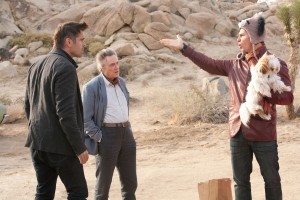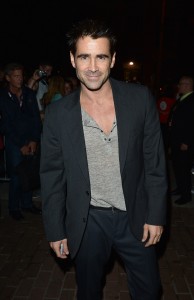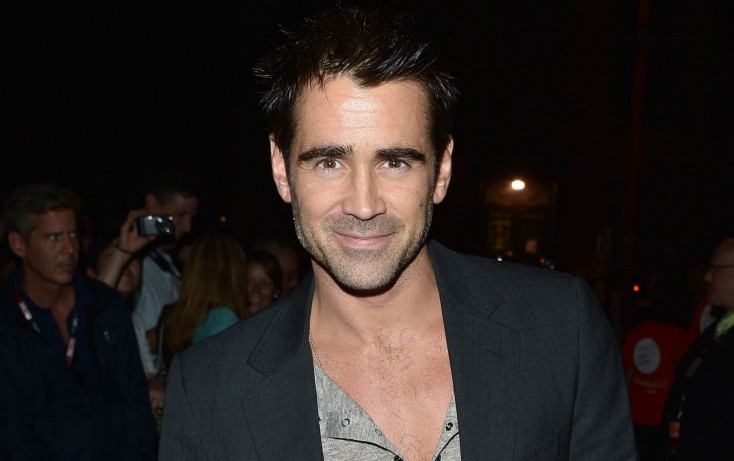
Colin Farrell (as Marty), Sam Rockwell (as Billy), and Christopher Walken (as Hans) star in CBS Films’ comedy “SEVEN PSYCHOPATHS.” ©CBS Films. CR: Chuck Zlotnick.
By ANGELA DAWSON
Front Row Features
HOLLYWOOD—Over the course of his career, Colin Farrell has played seven or so psychopaths, or at least characters that are unbalanced or on the verge of becoming unhinged. Extreme examples include the villainous Bullseye in “Daredevil,” the killer neighbor in 2011’s horror remake ‘Fright Night” and most memorably Ray, the anxious hit man, in Martin McDonagh’s dark comedy “In Bruges.”
The 36-year-old Irish actor and Hollywood’s favorite bad boy reteams with McDonagh for another dark comedy called “Seven Psychopaths.” Farrell, though, plays one of more normal characters in movie—an alcoholic screenwriter who gets mixed up in a friend’s plot to kidnap a dog that turns out to be the beloved pet of a notorious L.A. gangster. Mayhem, murder and philosophizing in the California desert ensue.
“Seven Psychopaths”—the title is inspired by McDonagh’s love for Kurosawa’s “The Seven Samurai”—also stars Sam Rockwell as Marty’s crazy friend Billy, as well as Tom Waits, Christopher Walken and Woody Harrelson as the angry gangster.
The busy Farrell already is working on his next film—“Saving Mr. Banks,” a behind-the-scenes tale of how the classic “Mary Poppins” came to be—but he took some time to talk by phone about working again with old pal McDonagh.
Q: The idea for “Seven Psychopaths” was cooking in Martin McDonagh’s head when you were making “In Bruges.” Did he talk to you about it?
Farrell: When we were shooting “In Bruges,” he mentioned he was only using it as a dry run, kind of a rehearsal to see if he liked directing film and if he was able to do it.
Q: How is this film different, aside from the setting?
Farrell: The canvas for “Seven Psychopaths” is so much broader, not to say that it doesn’t have the same specificity or the same brand of particularity that. The storylines and the amount of characters in the film and the amount of narrative back and forth and lack of linear sense, at times, in the film, was something that Martin made a really good call. He wanted to hone his craft a little bit more after (his 2005 short film) “Six Shooter” and “In Bruges,” and see if he felt confident enough to do “Seven Psychopaths.”
Q: Did you base part of your performance on him or other screenwriters you know?
Farrell: Not really. Martin has no interest in the backstory, but he clearly understands that actors like to lean on or create a backstory when they’re approaching a character. I didn’t need to research writers. There are elements of Martin that are in the character, of course. I’m playing a character called Martin and he’s writing a script called “Seven Psychopaths” in a film called “Seven Psychopaths” written by a guy called Martin. Mostly, we shared a curiosity for the ways and import of violence in film, and a writer’s responsibility to himself and the audience to have a clear voice, and say something about life and art and comment on it and not just be bourn of it.
Q: What led you play Marty, who’s kind of the straight man of the ensemble?

Actor Colin Farrell, star of CBS Films’ SEVEN PSYCHOPATHS, attends the film’s Midnight Madness screening at the Toronto International Film Festival.
Farrell: When I read the script, the Billy character played by Sam (Rockwell) kind of jumped off the page at me because it was more in keeping with what I was familiar with doing in the world of Martin McDonagh, which is playing a character that is un-PC and completely lacking in boundaries or have the ability to self-censor. All of these things were there in Billy and I recognized them and gravitated toward that, but then as soon as Martin shared with me that he was thinking of me for Marty and Sam for Billy, it made perfect sense.
Q: What did you like about your character?
Farrell: It was a case of exploring something that was different from the first time around (with McDonagh), which I really began to love. My character’s very much the observer in the film. Survivors write history and they chart the uprisings and downfalls of Man, and my character is very much the survivor at the end of the film. Sam’s Billy says to me, “Go on, Marty. Go write it up.” That’s my job, which is to chronicle what’s happened in the film. So it’s a very reactionary part. It was different and I thoroughly loved it. I got to observe and react to actors like Sam Rockwell, Christopher Walken, Abbie Cornish and Woody Harrelson, so I may be spoiled.
Q: Your character’s one big problem is that he drinks too much. He is repeatedly referred to as an Irish alcoholic. Did you have any objections to that?
Farrell: Martin is constantly poking fun at convention and turning conventions on their heads, and even the Irish writer in Hollywood trying to create something that’s violent but also inherently beautiful but coming up against some form of (writer’s) block has been well explored. I had no hesitations at all. I’m basically called an alcoholic by a man who’s killing people, and he’s disappointed with me and my behavior. Meanwhile, he’s putting a gun in a woman’s belly and he’s blown guys brains apart, so you take it with a large pinch of salt.
Q: Have you known anyone quite like Sam’s Billy character?
Farrell: I’ve known guys like Billy that were a liability. They were very charming and fun but the fun came at a cost and the cost was the potential for something to kick off at any time. They were funny but they couldn’t keep their mouths shut and they had to comment on everything they saw, but not as extreme as Billy, though.
Q: Had you worked with Tom Waits before?
Farrell: No. But we met at a dinner before we started shooting and he’s beautiful and kind of magical, and it was great getting to work with him. I say seven words in our scene together, and he’s got three pages (of dialogue) so I got to sit and listen to Tom Waits tell a story, which is kind of cool.
Q: With “In Bruges” and now “Seven Psychopaths,” do you feel you and Martin are developing a Scorsese-DeNiro relationship, where you do more stuff together? Has he tossed anything else at you?
Farrell: I would go to work with him in a second. I’d do anything with Martin. I love working with him. I love the singularity of his voice and I love his dialogue. I love him as a man. I just think he’s a radiating voice in film. He really is.
Q: How was it shooting in the California desert?
Farrell: It got cold out there at night, no doubt about it. But we had some hot tea and hot chocolate so it wasn’t too bad. All that stuff helps, whatever the environment is, unless you’re shooting in a cold environment that you’re supposed to be pretending like it’s hot, that could pose some issues. Any that affects the senses can inform you.
Q: What at this point do you feel you haven’t done yet in film? Is there some genre you’d like to do?
Farrell: Not really. I feel like I’m at the start of it. I feel each film really is—and I know this sounds twee—but it’s almost like my first film or the beginning of something new, which it is. But I feel that significantly so I’m fine just tripping over whatever experiences and opportunities and I hope to choose wisely and from a place of wisdom, and I ‘d like to continue to do as many types of genres and as many types of films and characters as I can.
Q: You’re shooting “Saving Mr. Banks” now?
Farrell: Yes. Shooting that tomorrow morning, I’m back on set. And then a thing called “Winter’s Tale.” And I just did a thing called “Dead Man Down.” So there are some different things that I’m fortunate enough that I get to explore, and I’m enjoying it.
Q: As a celebrity, do you realize that people think you don’t live in the real world they do?
Farrell: I wasn’t always famous. There was life before this, and I remember looking at celebrities, whether they were famous as a result of playing football (soccer), singing, yodeling or whatever. I’m sure they thought their lives are were beyond the realm of being affected in the way that I felt that normal people, such as me at the time, were affected by things, but it’s not really true. We all die. We all experience sickness. We all lose people we love. This fame thing, celebrity, or working as an actor and being paid very well in the last decade or so, has allowed me to do incredible things with money like get my nails buffed. (He laughs.) Or spend my holidays in leading hotels around the world. But what’s nice about it is when my grandparents were old, I could pay for a really nice folks home for both of them. I wouldn’t be doing that if it weren’t for acting.
Q: What career would you have picked if it weren’t for acting?
Farrell: Soccer.




